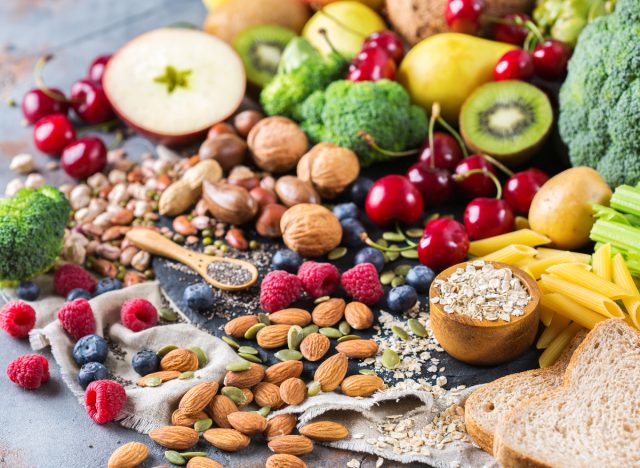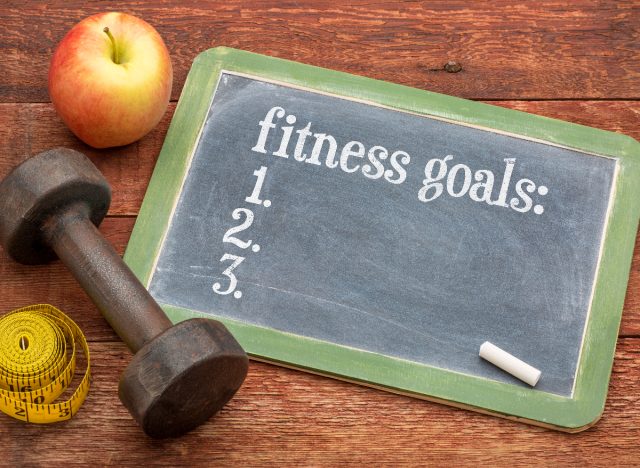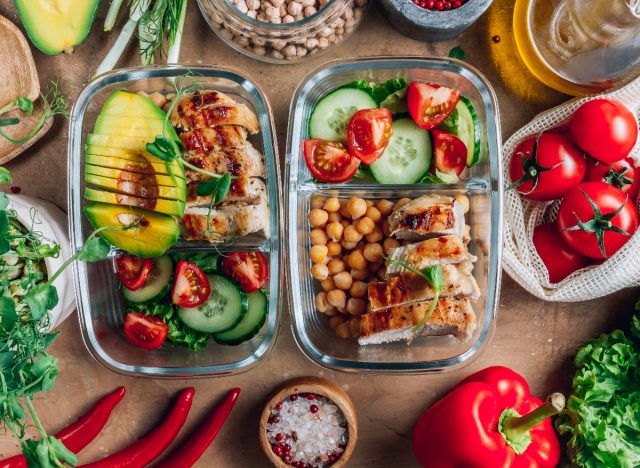As the new year unfolds, many of my clients embark on a journey to achieve a healthier and slimmer version of themselves. Transforming your body in just one month may seem ambitious, but with a strategic approach encompassing diet, fitness, and lifestyle changes, it’s an achievable goal. In this comprehensive guide, I’ll outline a one-month weight-loss challenge, incorporating evidence-backed tips that promote sustainable results and foster a healthier lifestyle.
Gear up to reveal a slimmer, healthier version of yourself in the new year. The rules are simple—just follow these habits consistently throughout the month and beyond. Remember that sustainable changes lead to lasting results, and each small step contributes to your overall success.
Keep reading for my one-month weight-loss challenge, and when you’re finished, be sure to check out 9 Lazy Ways to Lose Weight All Month Long.
Prioritize protein intake for satiety and muscle preservation.

This one-month weight-loss challenge kicks off with prioritizing protein. Research consistently shows that increasing protein intake can aid weight loss by promoting feelings of fullness and preserving lean muscle mass. Aim to include lean protein sources such as chicken, fish, tofu, and legumes in each meal. Studies suggest that a higher protein intake can boost metabolism and reduce overall calorie consumption, supporting your weight loss goals.
Embrace a balanced, fiber-rich diet.

Integrate a variety of fruits, vegetables, whole grains, and legumes into your meals to increase fiber intake. High-fiber foods contribute to satiety, control blood sugar levels, and promote a healthy digestive system. Studies indicate that a diet rich in fiber may enhance weight loss and improve overall metabolic health.
Hydrate for weight-loss success.

Staying adequately hydrated is crucial for overall health and can play a role in weight loss. Research suggests that drinking water before meals can reduce calorie intake, aiding in weight loss efforts. Challenge yourself to consume at least eight glasses of water a day, and consider replacing sugary drinks with water or herbal teas to cut unnecessary calories.
Set realistic and specific fitness goals.

Incorporate a well-rounded fitness routine into your daily schedule. Aim for at least 30 minutes of moderate-intensity aerobic exercise, such as brisk walking or cycling, five days a week. Additionally, engage in strength training exercises at least twice a week to build lean muscle mass. Setting specific and achievable fitness goals enhances motivation and contributes to long-term success.
Implement high-intensity interval training (HIIT).

Studies show that HIIT can be highly effective for weight loss, thanks to its ability to elevate metabolism and burn calories both during and after the workout. Therefore, you should include 15 to 20 minutes of HIIT sessions into your weekly routine, alternating between short bursts of intense activity and brief periods of rest.
Practice mindful eating habits.

Mindful eating involves paying attention to your food choices, savoring each bite, and recognizing hunger and fullness cues. Studies suggest that practicing mindfulness during meals can contribute to weight loss by reducing emotional eating and promoting a healthier relationship with food. Challenge yourself to eat without distractions and savor the flavors of each meal.
Get sufficient quality sleep.

Prioritize sleep as a crucial component of your weight-loss journey. Lack of sleep has been linked to weight gain and increased cravings for high-calorie foods. Establish a consistent sleep schedule, aiming for seven or more hours of quality sleep each night. Adequate rest supports overall well-being and helps regulate hormones that influence hunger and metabolism.
Plan and prepare meals ahead of time.

Setting aside time for meal planning and preparation can prevent impulsive, unhealthy food choices. Research suggests that individuals who plan their meals are more likely to make nutritious choices and maintain a healthy weight. Challenge yourself to schedule dedicated time each week for planning and preparing meals to support your weight loss goals.
Limit added sugars and processed foods.

Studies consistently link high sugar and processed food intake to weight gain and an increased risk of obesity-related diseases. Challenge yourself to reduce or eliminate added sugars and highly processed foods from your diet. Opt for whole, nutrient-dense foods that provide essential vitamins and minerals without unnecessary empty calories.
Foster a supportive environment.

Surround yourself with a positive and supportive environment to boost your chances of success. Having a support system can enhance weight loss outcomes, so make it your mission to share your goals with friends or family, join fitness classes or online communities, and celebrate achievements together.








